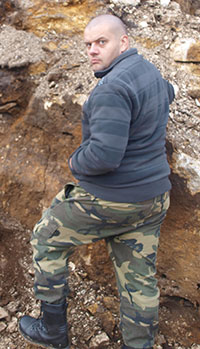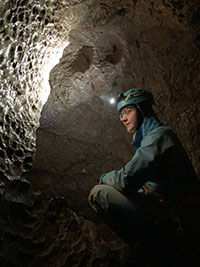 Adrian Marciszak. Department of Paleozoology, University of Wrocław, Sienkiewicza 21, 50-335 Wrocław, Poland. adrian.marciszak@uwr.edu.pl
Adrian Marciszak. Department of Paleozoology, University of Wrocław, Sienkiewicza 21, 50-335 Wrocław, Poland. adrian.marciszak@uwr.edu.pl
Palaeontologist from the Department of Paleozoology, University of Wrocław, where he completed master’s degree (Early Pleistocene carnivores from Żabia Cave) and the doctorate in the same area (systematic studies of the Plio-Pleistocene mustelids from Poland), graduating from the latter in 2012. Since 2010 he worked at the University of Wrocław. His main interest in the area of systematic studies of fossil and extant carnivores, with particular interest to the European area. Studies concentrate mostly on the determine its taxonomic identity and interpret the geological processes and biological factors that allowed its establishment.
![]()
 Aleksandra Kropczyk. Department of Paleozoology, University of Wrocław, Sienkiewicza 21, 50-335 Wrocław, Poland (corresponding author). aleksandra.kropczyk2@uwr.edu.pl
Aleksandra Kropczyk. Department of Paleozoology, University of Wrocław, Sienkiewicza 21, 50-335 Wrocław, Poland (corresponding author). aleksandra.kropczyk2@uwr.edu.pl
Paleontologist at the Department of Paleozoology, University of Wrocław. In 2021, she completed her master’s thesis titled “Morphometric Analysis of Mammal Remains (Mammalia) from the na Wrzosach Południowa Cave (Polish Jura)” and began her doctoral studies. She is currently working on a PhD research project titled “Remains of Canidae Fischer de Waldheim, 1978 from the Pliocene and Pleistocene of Poland against the background of the evolution of the family in Europe”. Her research focuses on the analysis of fossil carnivores, particularly canids, within the context of their evolutionary development in Europe. She is also interested in the domestication of the dog, which plays an important role in understanding human-animal relationships in prehistory. Additionally, her work investigates ecological and biological interactions among various Pleistocene faunal species, providing insights into the ancient ecosystems of that period.

